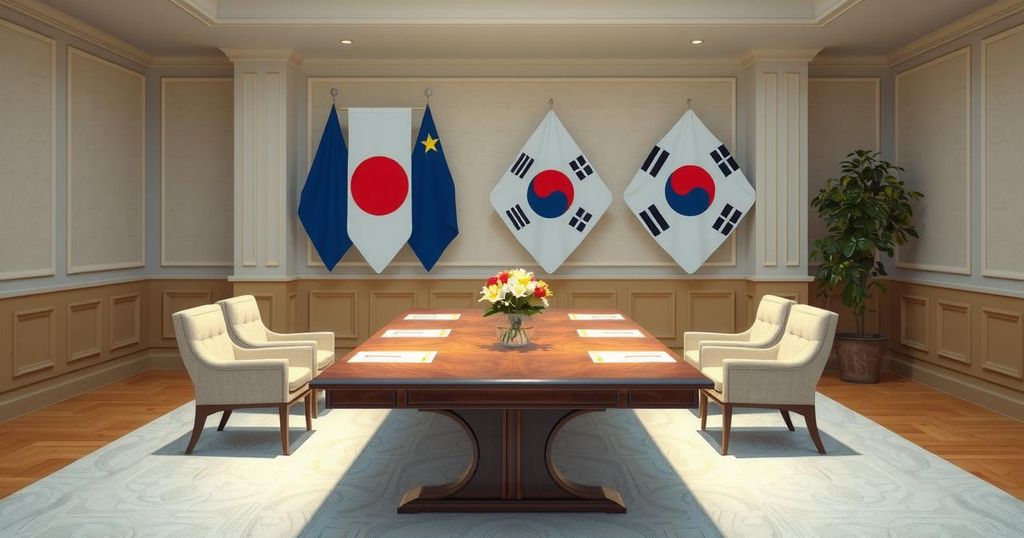Ukraine and South Korea Discuss Repatriation of North Korean Captives

On March 17, 2025, South Korean and Ukrainian officials discussed repatriating two North Korean soldiers captured during the Ukraine-Russia conflict. South Korean Foreign Minister Cho Tae-yul emphasized the necessity for the soldiers to express a desire for relocation due to constitutional considerations. The need for their repatriation arises amid North Korea’s troop deployments to support Russia, following significant casualties among North Korean forces.
On March 17, 2025, diplomats from South Korea and Ukraine met to discuss the potential repatriation of two North Korean soldiers captured during the Ukraine-Russia conflict. South Korean Foreign Minister Cho Tae-yul engaged in talks with Ukrainian counterpart Andrii Sybiha regarding the transfer of these prisoners from the Democratic People’s Republic of Korea (DPRK). The discussions reveal the intricate constitutional issues surrounding their status, as Cho highlighted that North Koreans are considered South Korean citizens, provided they express a desire to relocate.
This negotiation follows the significant deployment of approximately 12,000 North Korean troops to aid Russian military efforts against Ukraine, especially amidst Russia’s severe manpower shortages. According to Ukrainian President Volodymyr Zelensky, early intelligence indicated that over 4,000 North Korean soldiers suffered casualties, with a substantial portion reported killed following a series of cross-border incursions.
The two captured North Korean soldiers were apprehended alive on January 11, 2025, representing the first such instance of captured North Korean personnel. They are currently receiving medical care under the custody of the Security Service of Ukraine (SBU). A prior North Korean soldier captured two weeks earlier unfortunately succumbed to injuries.
Historically, South Korea has received about 34,000 defectors from North Korea since the late 1990s, presenting both opportunities and diplomatic challenges. Accepting the two soldiers could enhance South Korea’s humanitarian image but may also complicate relations with both North Korea and Russia, especially amidst fears of further troop deployments from North Korea.
The captured soldiers have, as of January, not indicated any desire to defect according to the South Korean National Intelligence Agency, complicating the situation further. As tensions rise, North Korean forces have been noted to implement aggressive tactics on the frontlines, leading to dire outcomes cemented by poor combat experience, as acknowledged by Ukrainian officials.
In a significant discourse on social media platform X, Sybiha conveyed appreciation for South Korea’s partnership while stressing the importance of addressing the hazardous cooperation between Russia and North Korea, which he views as harmful to global security. The uncertain response from North Korea regarding their soldiers’ potential relocation raises questions about its strategic motivations.
Yeonmi Park, a North Korean defector, criticized Ukraine through a tweet, accusing it of breaching international law by linking prisoner repatriation to arms trading, indicating the delicate balance of humanitarian versus strategic interests involved in this situation.
Zelensky noted the risks regarding the capture of North Korean personnel, underscoring the perilous circumstances under which these soldiers were taken, given the propensity for Russian and North Korean forces to eliminate their wounded to obscure military involvement.
The unresolved stance of North Korea regarding these soldiers symbolizes the complex dynamics that define ongoing geopolitical relations. The unfolding resolution will not only determine the futures of the captured soldiers but also reflect broader shifts in international alliances amid ongoing conflict, showcasing the intertwining of humanitarian and military considerations.
The discussions between South Korea and Ukraine over the potential repatriation of North Korean soldiers underscore the complexities of international diplomacy amid conflict. The status of the captured soldiers remains uncertain, particularly given their lack of expressed desire to defect. With heightened tensions and the complicated backdrop of North Korean military deployments, this situation poses significant implications for regional security and international relations. Ultimately, the evolving dynamics may reflect deeper strategic intentions as nations navigate humanitarian concerns alongside military imperatives.
Original Source: evrimagaci.org








